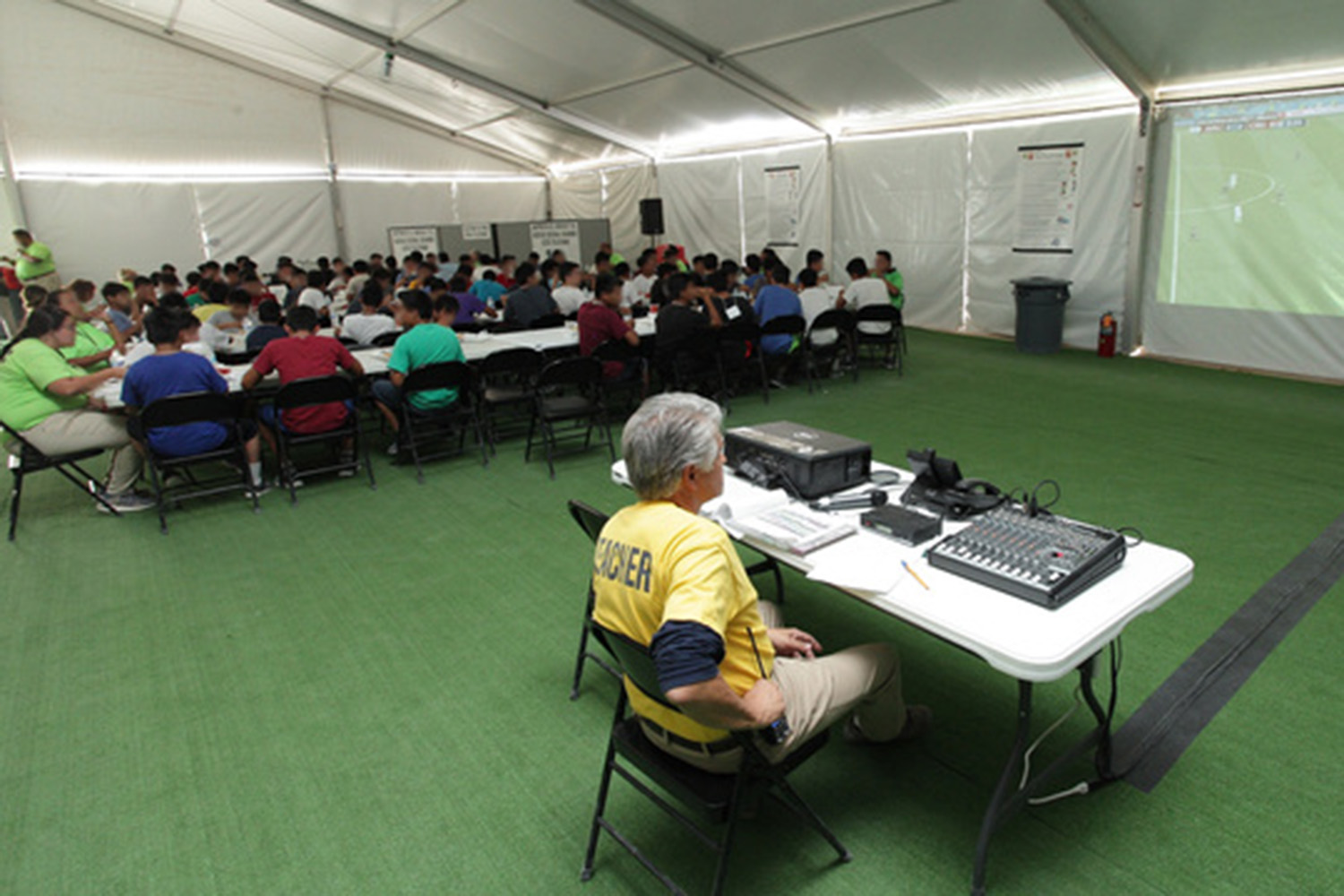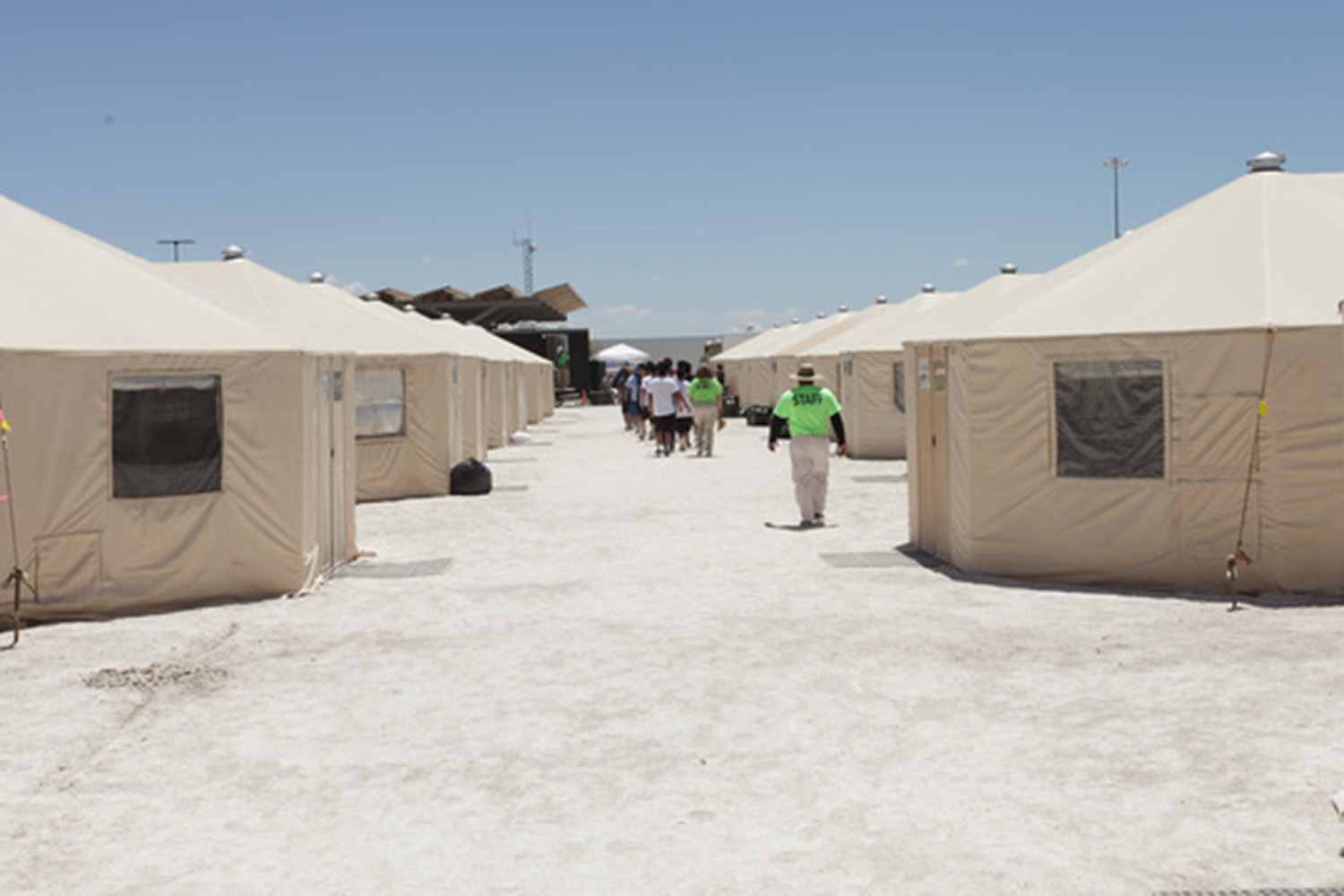Operator of migrant facility in Tornillo says it might not stay open past July 13 when contract expires
/https://static.texastribune.org/media/files/b29b7127bea91ca40726837fd767025a/tornillo_HHS_TT_2.jpg)
Families Divided

The Trump administration's “zero tolerance” immigration policy, which led to the separation of children from adults who crossed the border illegally, has fueled a national outcry. Sign up for our ongoing coverage. Send story ideas to tips@texastribune.org.
More in this seriesTORNILLO — The tent city erected at this port of entry near El Paso was quickly built and opened less than two weeks ago to house undocumented immigrant children. On Monday, its operator said it may not keep operating after July 13, when its federal contract expires.
The incident commander for BCFS Health and Human Services, which operates the facility, said he doesn’t yet see a need to extend operations beyond that date because he doesn't expect the arrival of many more minors. But a spokesperson for the U.S. Department of Health and Human Services told reporters during a tour of the facility that the government could ask to extend the contract — and even expand the facility if needed.
“The federal government will make a decision [later] about future needs,” said HHS spokesman Mark Weber.
HHS and BCFS officials gave about two dozen reporters a tour of the controversial facility, although they did not allow photography or audio recordings and interactions with the children were limited to greetings.
As of Monday morning, the facility housed 326 minors, including 162 from Guatemala, 117 from Honduras, 40 from El Salvador, three from Mexico and four from countries simply classified as “other.” About two dozen children who were separated from their families at the border have arrived at the facility, and officials said three of those children have so far have been reunified with family members. Another 67 of the unaccompanied minors who arrived alone have been reunited since arriving at the facility.

Reporters were given a briefing on the facility's operations inside a mobile command unit, where about 12 BCFS staffers monitored the facility through cameras and computer screens, monitored a schedule of visitors and updated a daily tally of the facility’s population. The BCFS incident commander, who asked not to be identified by name, said security was essential due to the number of elected officials and media who had descended on the facility.
The rest of the sprawling facility, constructed in just three days, consisted of about 20 tents that act as dormitories. Each unit, with names like Alpha 10, has 10 bunk beds equipped to handle 20 minors at a time. Drawings and pages from coloring books could be seen tacked to some of the walls, many containing Bible verses, and a daily schedule dictating everything from laundry to lunch was taped to a table at the dorm entrances.
When one group is waiting in line to use the showers, another is taking its turn at the phone stations. And before it gets too hot, some of the minors are allowed to play soccer on a makeshift field that sits just south of the dormitories. Every unit is air conditioned and Weber said there have been no complaints about the heat.
The BCFS official said the operation is staffed by about 250 people, including translators, medical staff and counselors that help the children make calls to family members. He said it resembles a boot camp because it’s the easiest way to keep order.
He had scathing words for the Trump administration’s “zero tolerance” mandate that resulted in the separation of thousands of minor children from their parents after they were apprehended or surrendered themselves at the border.
“It was an incredibly dumb, stupid decision,” he said, adding several times he hopes to never again conduct an operation like this one.

Meanwhile, Weber pushed back against claims that HHS and the Office of Refugee Resettlement’s process to reunite parents with their children has been chaotic so far. Several legal aid providers have criticized the process, saying it consists of little more than a 1-800 number that parents of other advocates can call to get information on where their children are.

The Texas Tribune's reporting on the Families Divided project is supported by the Pulitzer Center, which will also help bring discussions on this important topic to schools and universities in Texas and across the United States through its K-12 and Campus Consortium networks.
“We know where the parents are, we are working as fast as we can” to get them in touch with their children, Weber said.
He said some anecdotal stories about parents unable to locate their children isn’t the reality for most families. He said the process also includes verifying that a person is authorized to accept the child, and that takes time.
“We need to verify documentation [because] we don’t want to release a child too soon. It takes time.”
Information about the authors
Learn about The Texas Tribune’s policies, including our partnership with The Trust Project to increase transparency in news.
/https://static.texastribune.org/media/profiles/Julian_gt6QdKD.jpg)